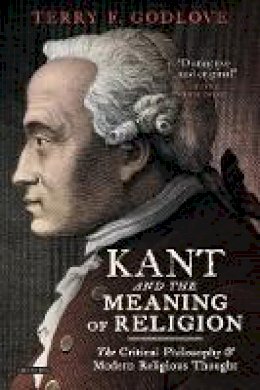Terry F Godlove is Professor of Religion and Philosophy at Hofstra University. His previous books include Religion, Interpretation and Diversity of Belief (1989, paperback 1997) and Teaching Durkheim (2005). He is a former editor of the Texts and Translations series of the American Academy of Religion.
Kant and the Meaning of Religion aims to show how Kant's philosophy serves as a valuable resource for navigating challenging methodological issues in the field of religious studies. Godlove's aim is not to commend or support Kant's own philosophy of religion but to draw from its epistemology in ways that advance the discussion of key themes in the academic study of religion. This requires the reinterpretation or even rehabilitation of the Kantian themes in question, resulting in fresh perspectives on Kant as well as on the field of religious studies. Godlove's book is quite distinctive for the way it draws on Kant to address religious issues with virtually no appeal to the more familiar references to the ethical element in his philosophy of religion. Moreover, the author announces early on that the Kant of this volume "has no substantive connection with Christianity," ensuring that his project should have wide application across the field of religious studies and should not be viewed as relevant only to the study of religion in the West. Nor should the volume be seen as one more in a series of works concerning the relative compatibility between Kant's religious thought and the biblical outlook. Consequently, one gets the sense of something genuinely fresh and sophisticated in the way in which Kant's thought is invoked here. In short, the book is provocative, constructive, and very welcome. I think it has tremendous long-term value and should provoke considerable debate. It reflects not simply the competent efforts of a mature scholar, but the assured work of a seasoned thinker who has a creative and bold suggestion to make about important matters. In suggesting an unexpected but potentially very fruitful way in which Kant's epistemology can promote the entire field of the academic study of religion, it is in fact an intellectual head-turner'. Gordon E Michalson, Jr, Professor of Humanities, New College of Florida, author of Fallen Freedom: Kant on Radical Evil and Moral Regeneration and of Kant and the Problem of God 'This is a distinctive and original contribution to the current interest in Kant's relevance for philosophy of religion. Rather than focusing on Kant's concept of God and philosophical theology, Godlove shows how his epistemology and reflection on the role of concepts in experience can illumine topics in the study of religion. His reading of Kant is informed by issues raised by Nietzsche, Geuss, Brandom, and McDowell, among others, and by recent theorists of religion. I recommend it highly.' Wayne Proudfoot, Professor of Religion, Columbia University 'This bold and carefully-argued monograph takes issue with Nietzsche's claim that Kant, even in the first Critique, displays himself as a "cunning Christian". Godlove convincingly refutes Nietzsche by demonstrating that the key theories defended in the first Critique, especially the distinction between appearance and thing in itself, are not concessions to Christianity. Rather, Kant posed the problem that called into being the philosophy of religion as a modern discipline. Thus, in a way that is distinct from theology (where God's existence is assumed and/or - presumably - "proved"), Kantian epistemology sets theism and atheism on an equal footing, as genuine alternatives, thus making the modern secular age possible for the first time. Godlove's provocative claim, that Kant moves toward a reductionist position that ultimately embraces religion without God, is sure to spark resistance from those who see Kant's later work (especially Religion within the Bounds of Bare Reason) as the work of a Christian reformer. What will not be debatable, for those who take on board Godlove's impressive argument, is that in the first Critique Kant does not express his final position on the meaning of religion, but only lays the philosophical groundwork for his subsequent discussions.' Stephen R Palmquist, Professor of Religion and Philosophy, Hong Kong Baptist University

